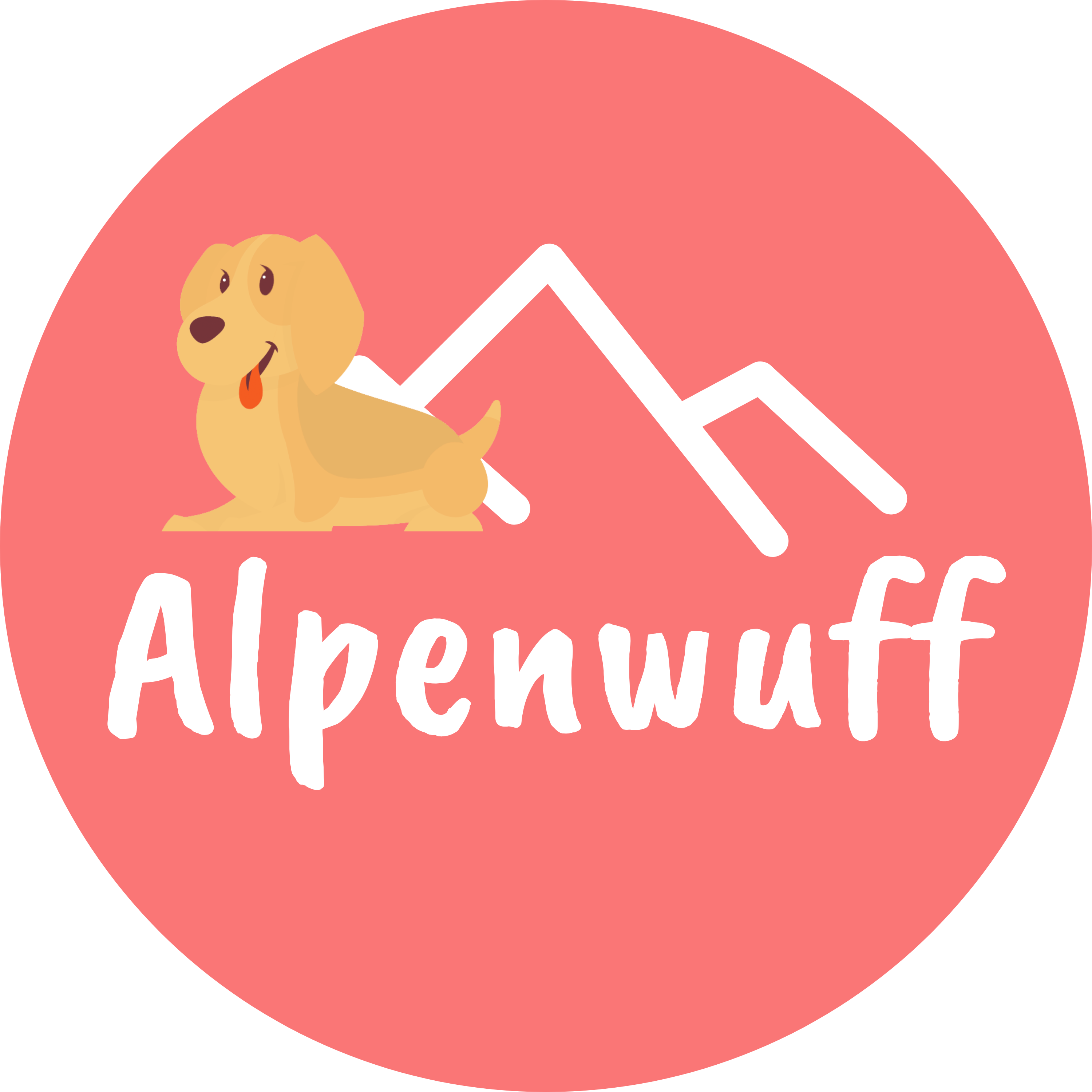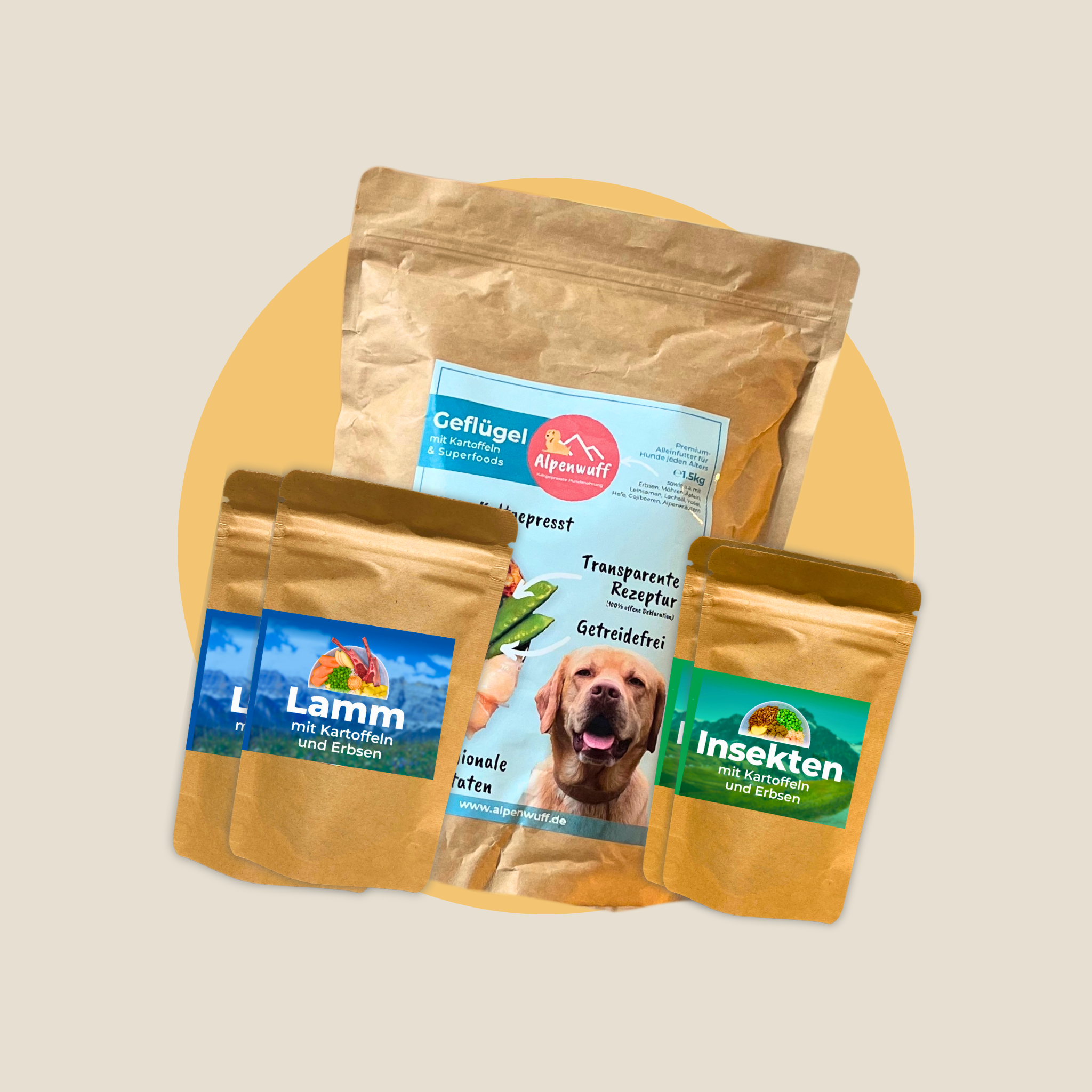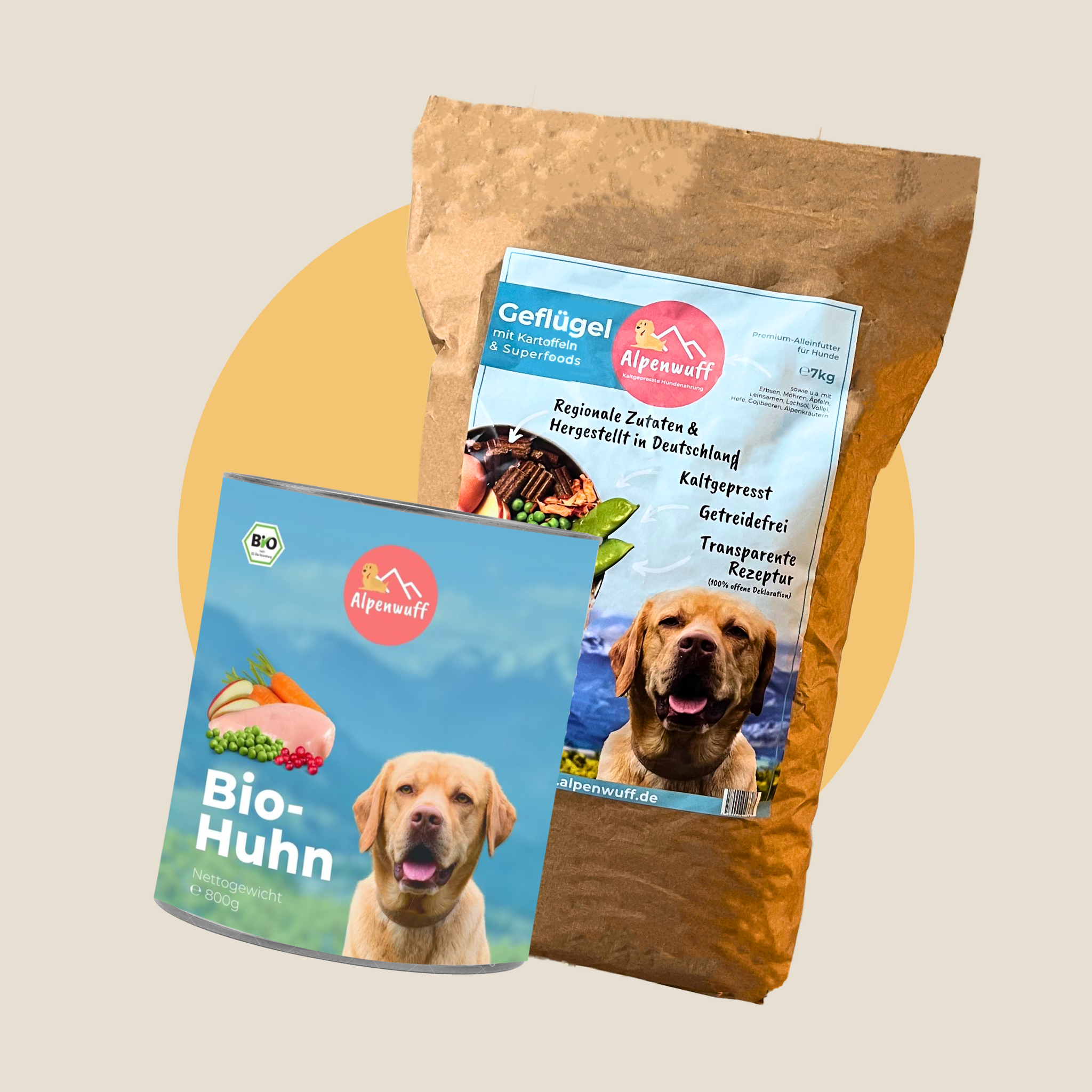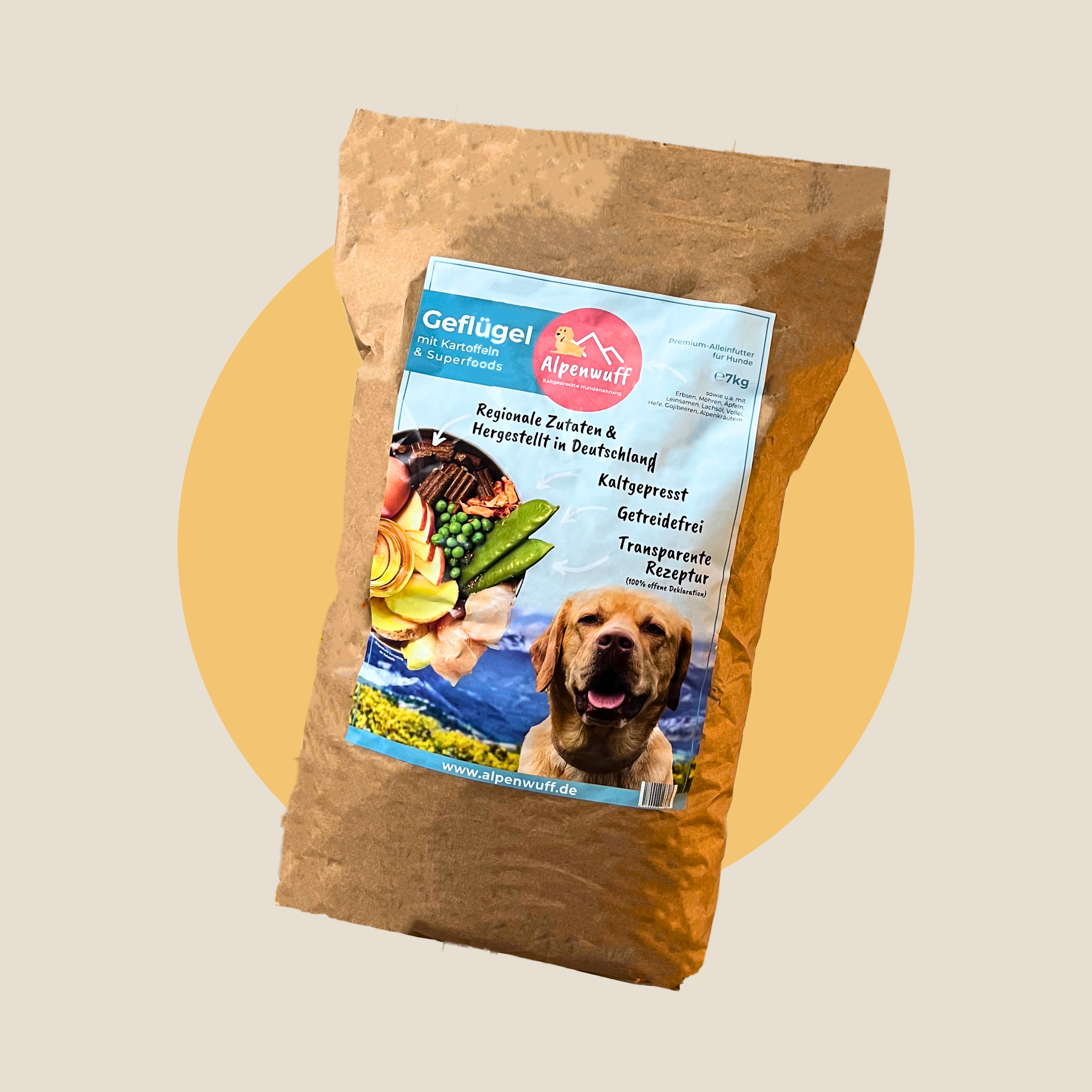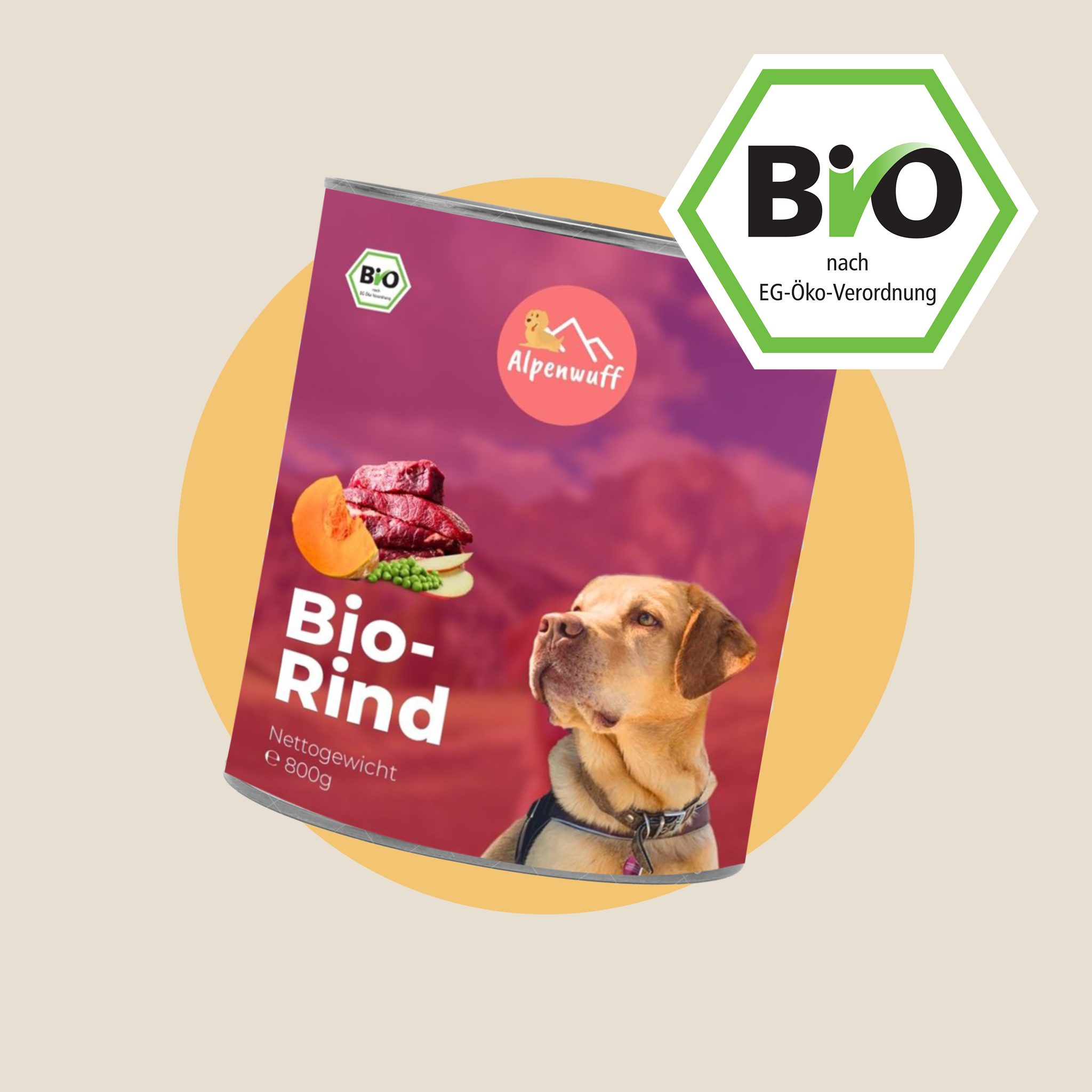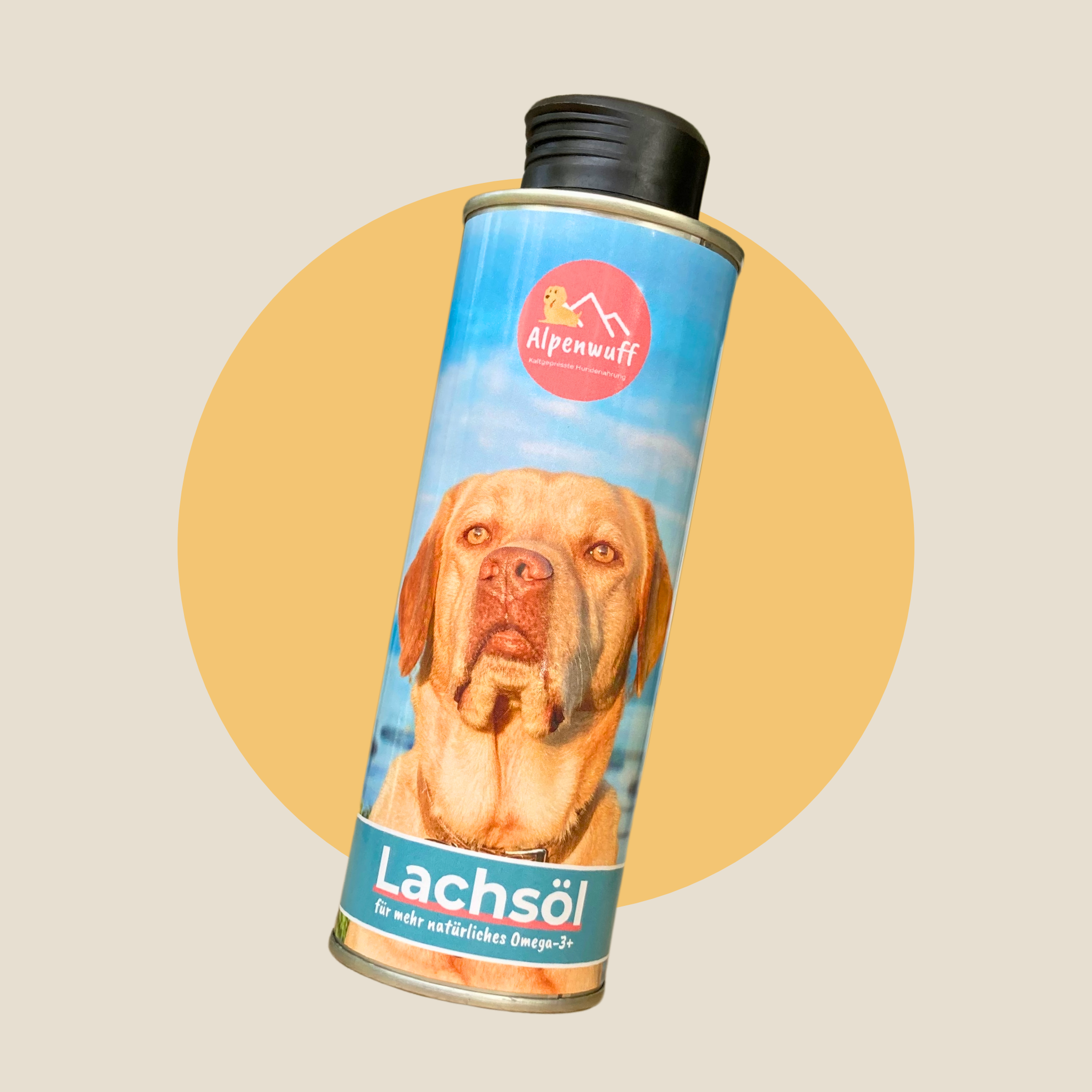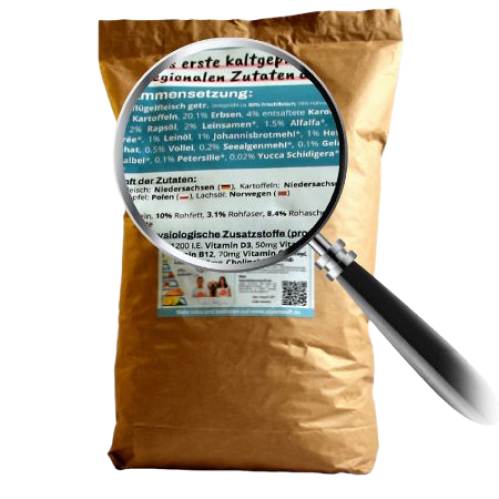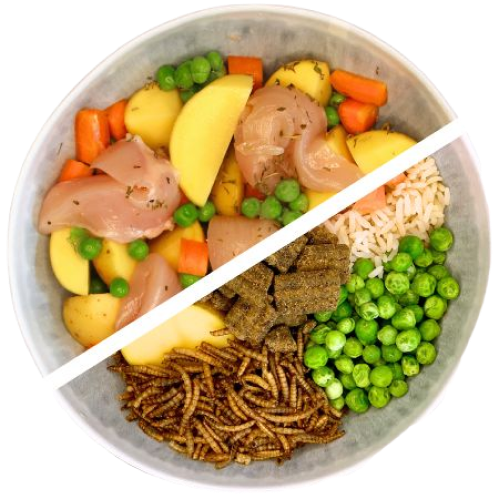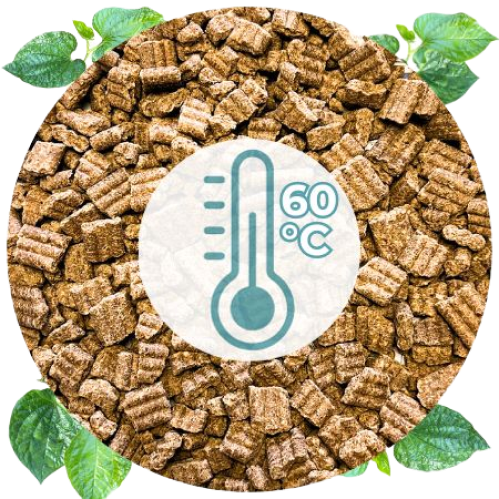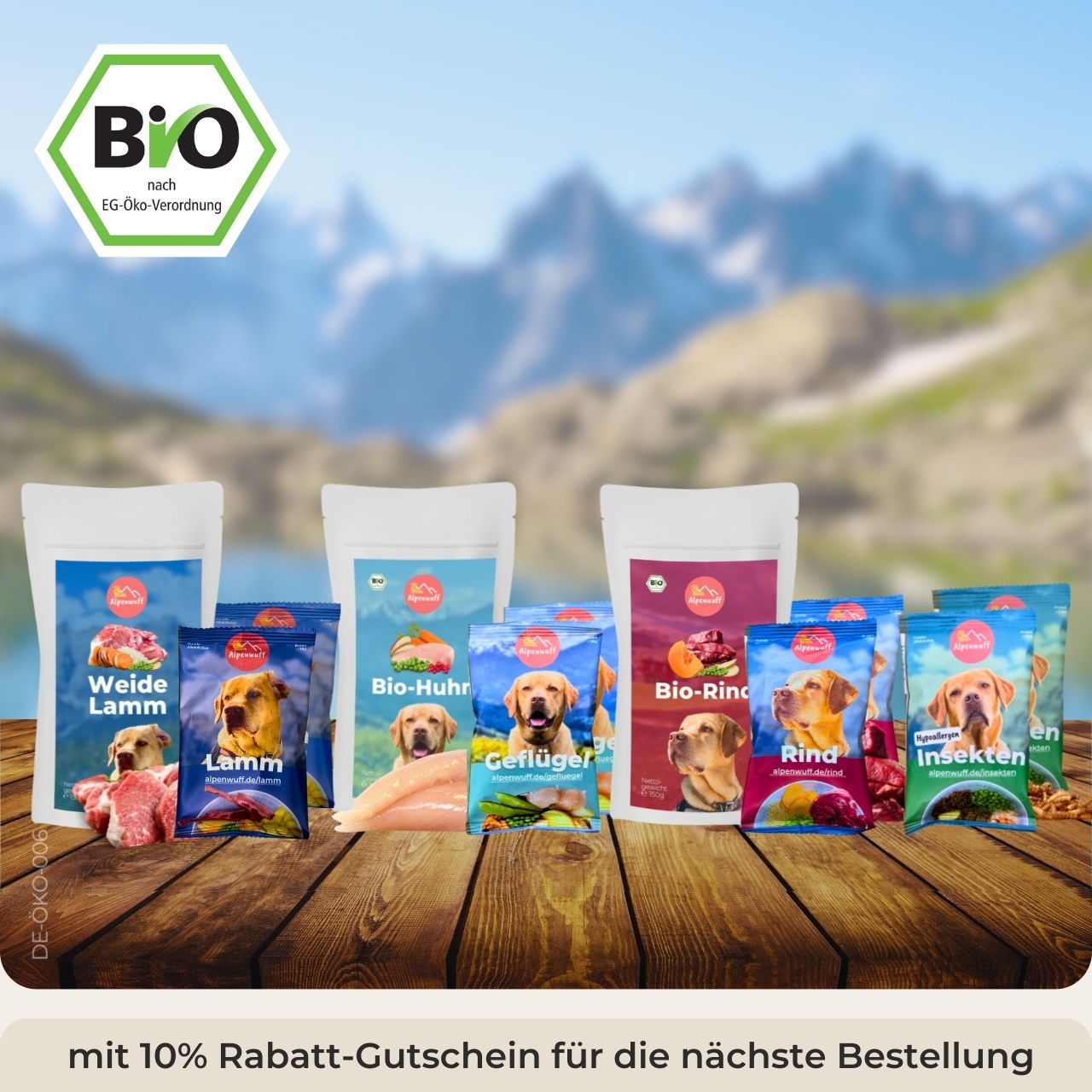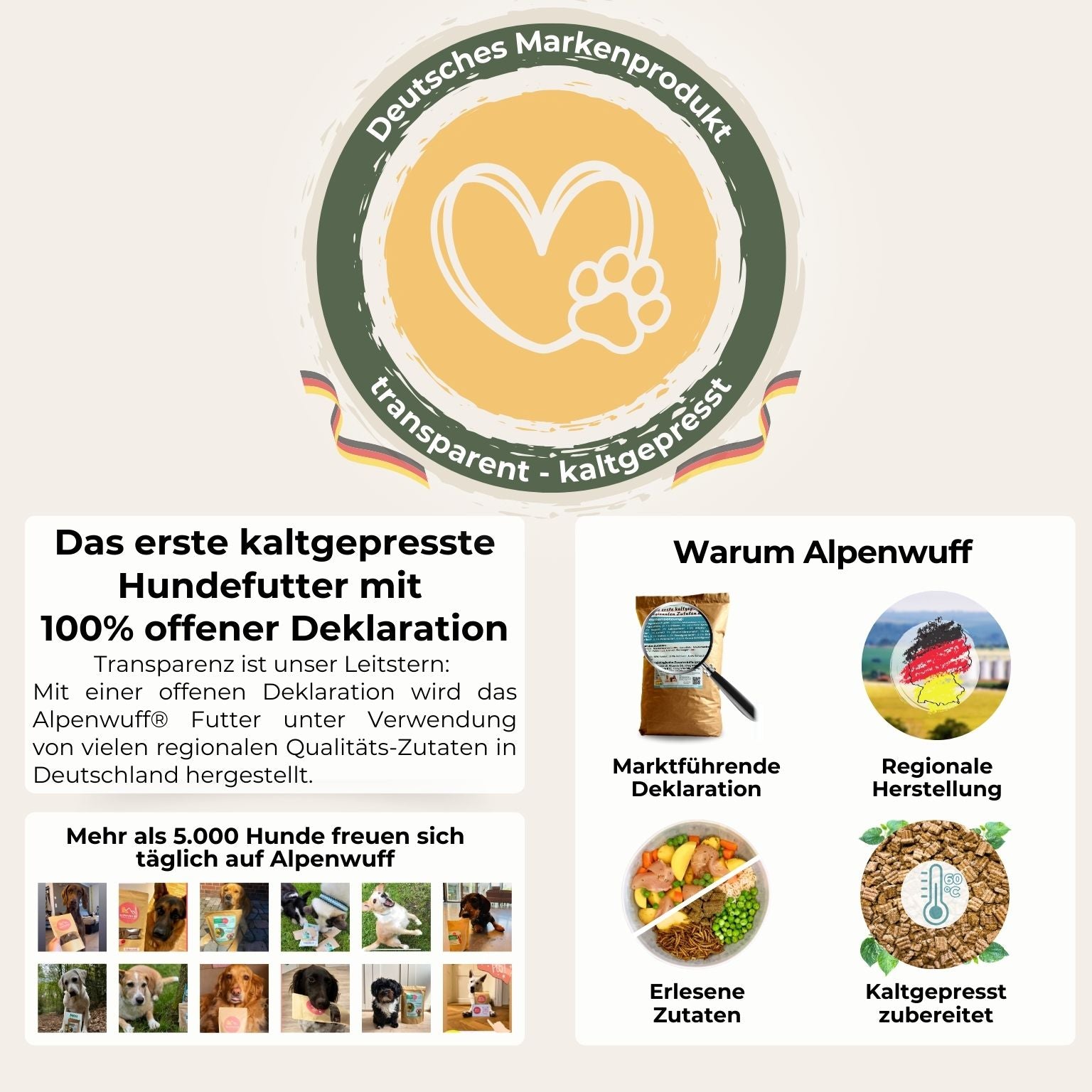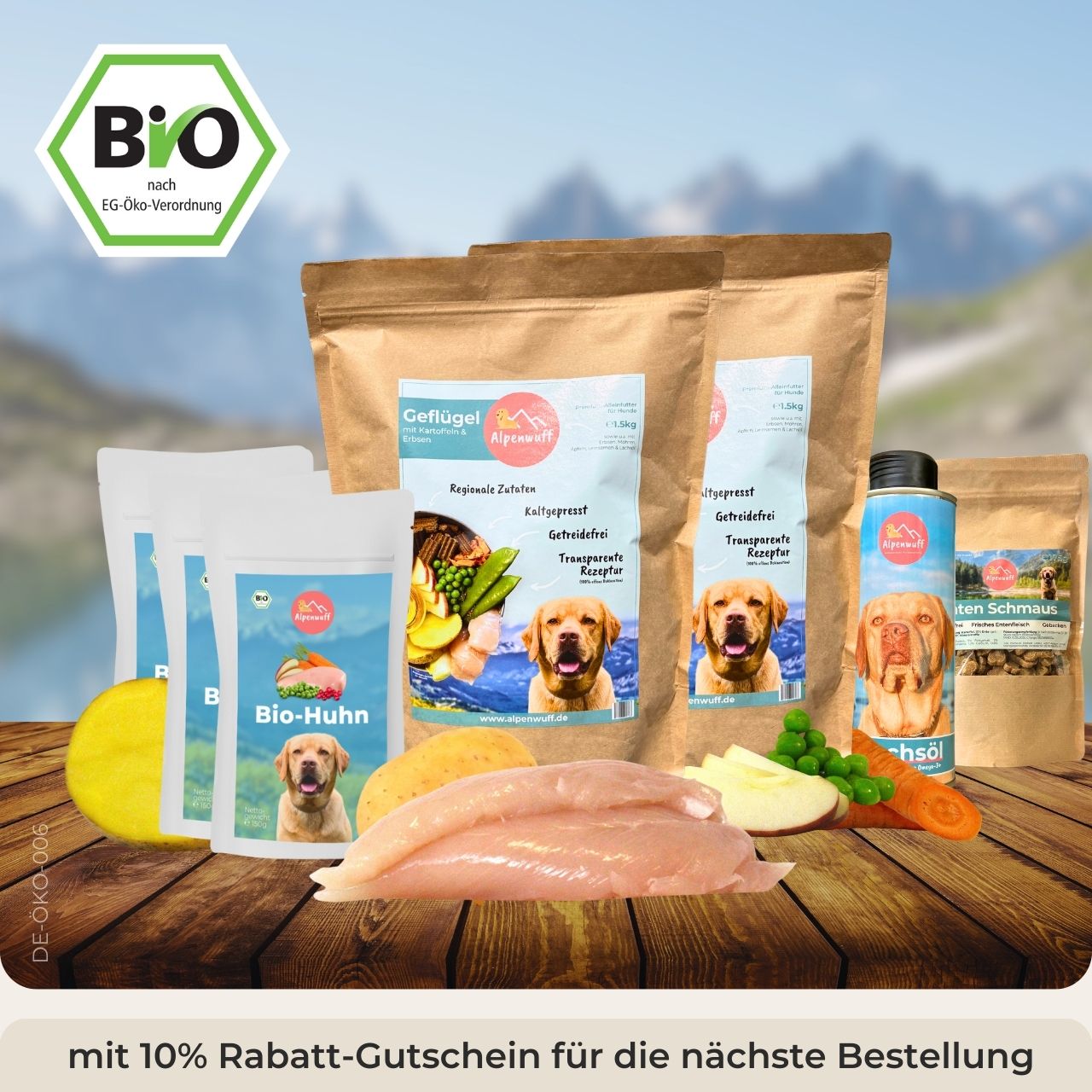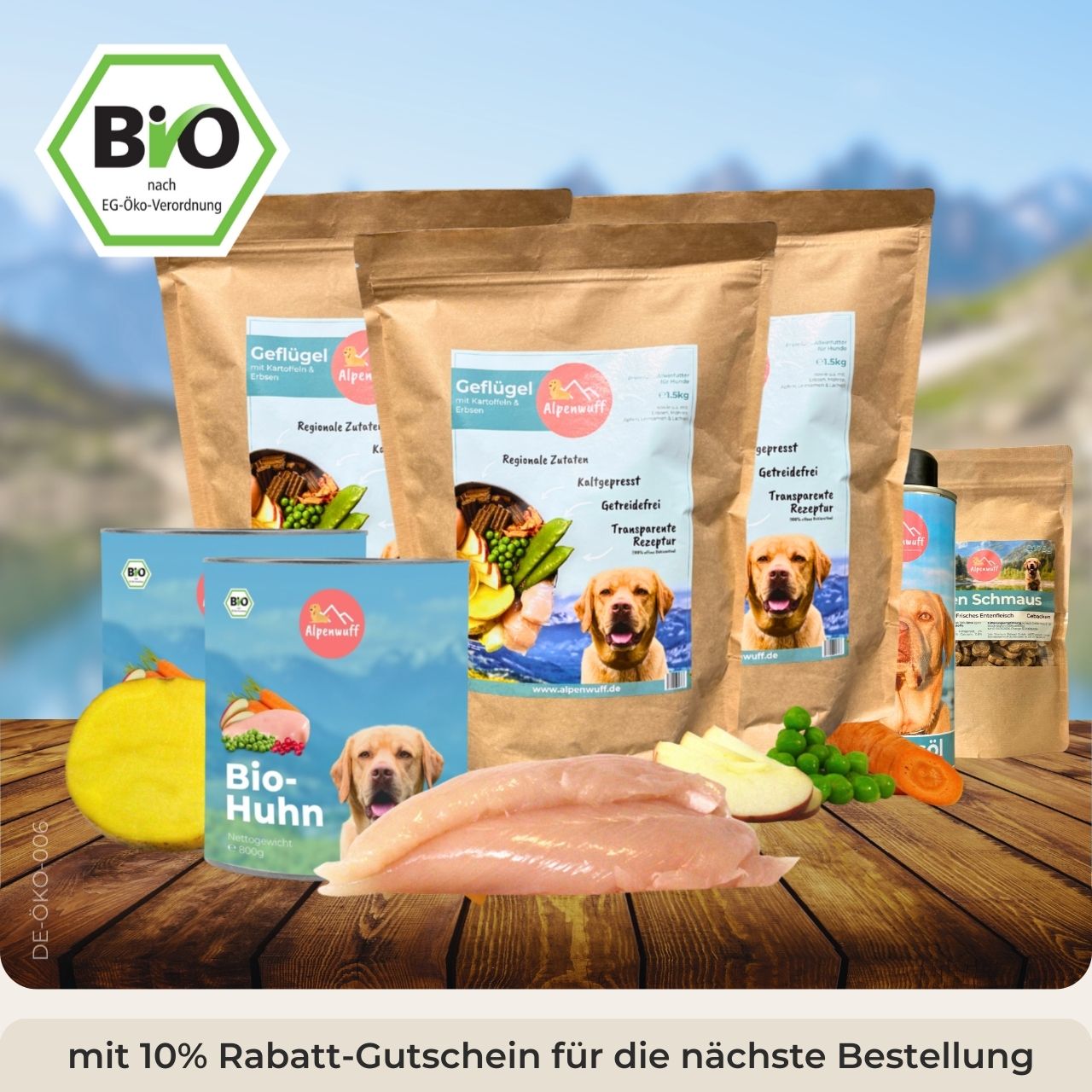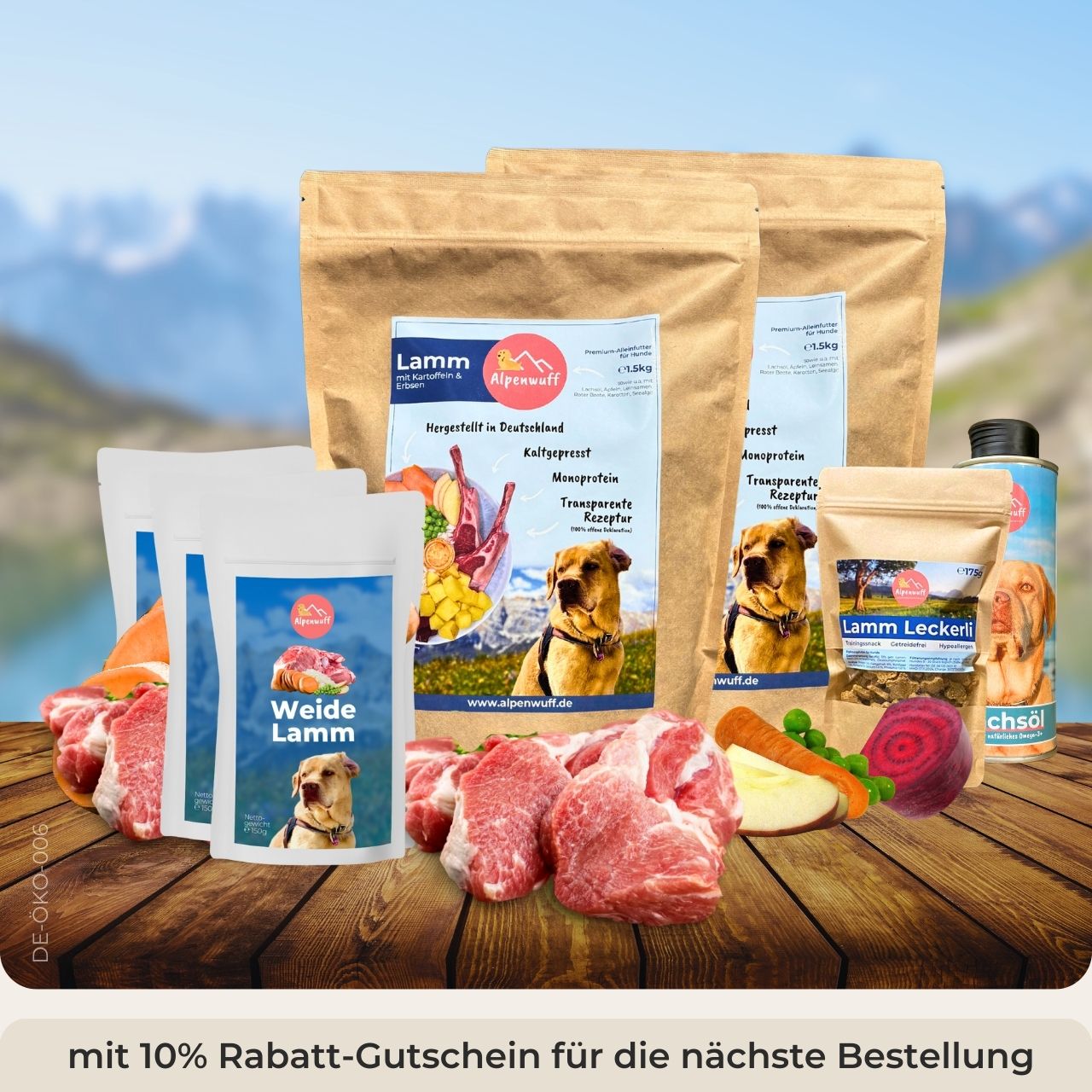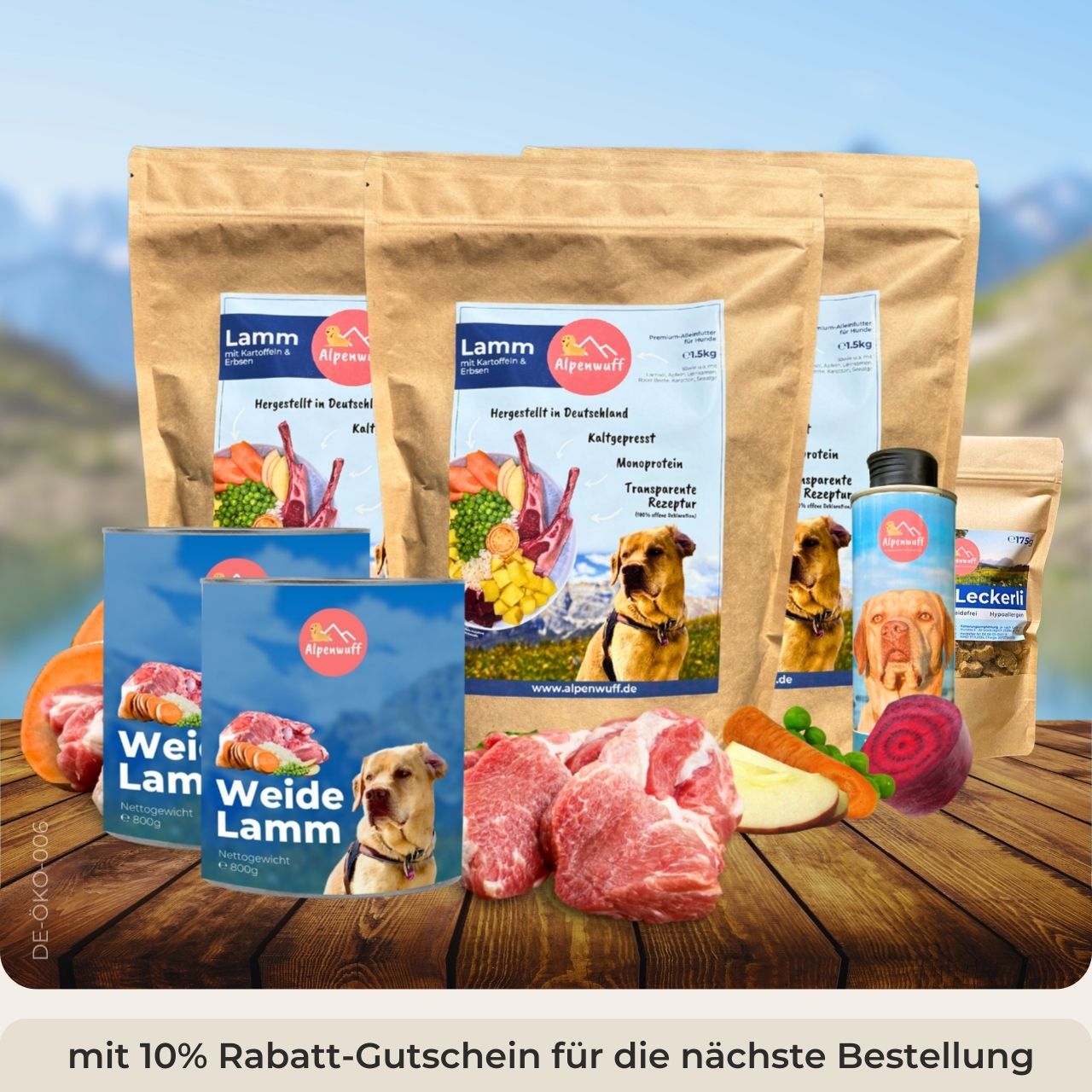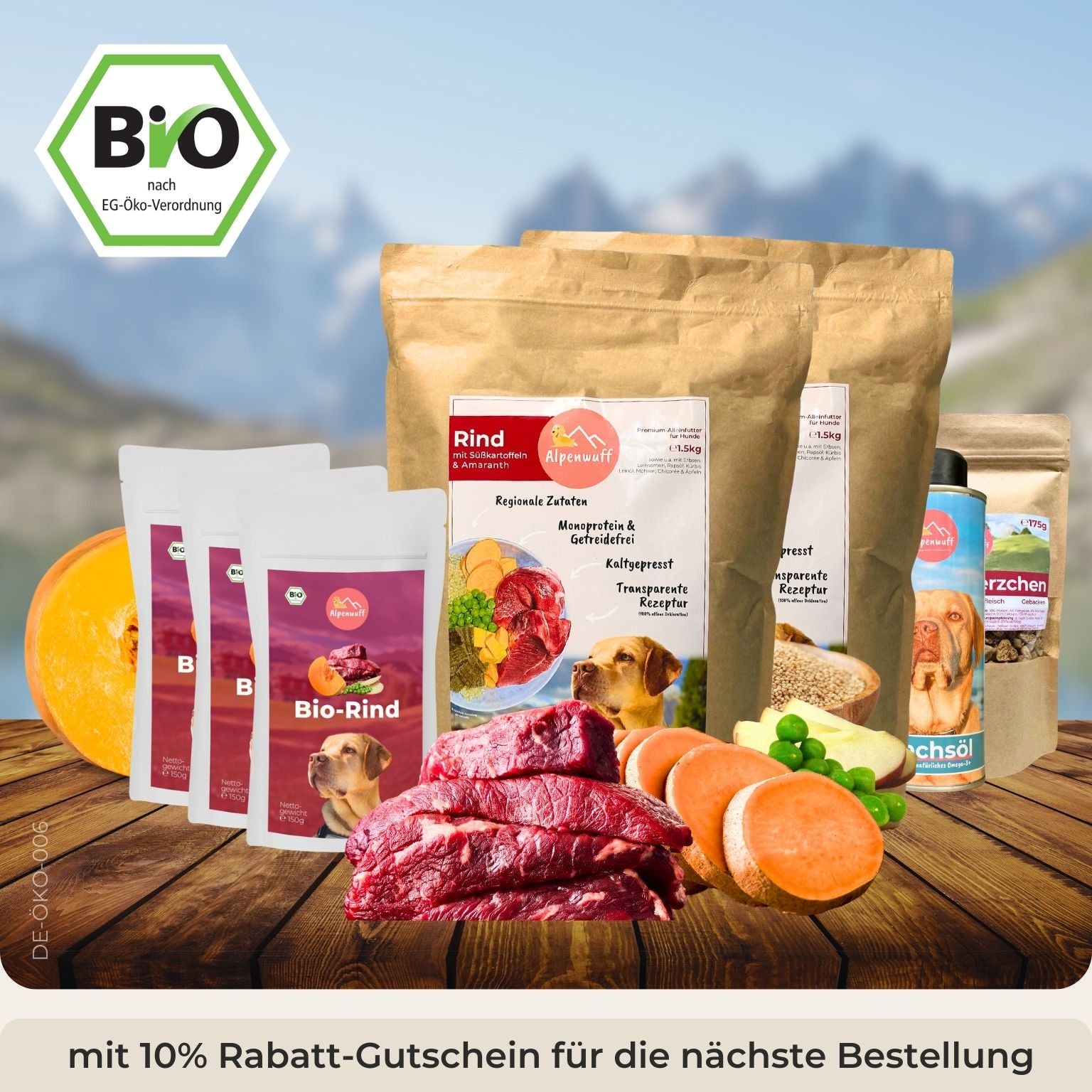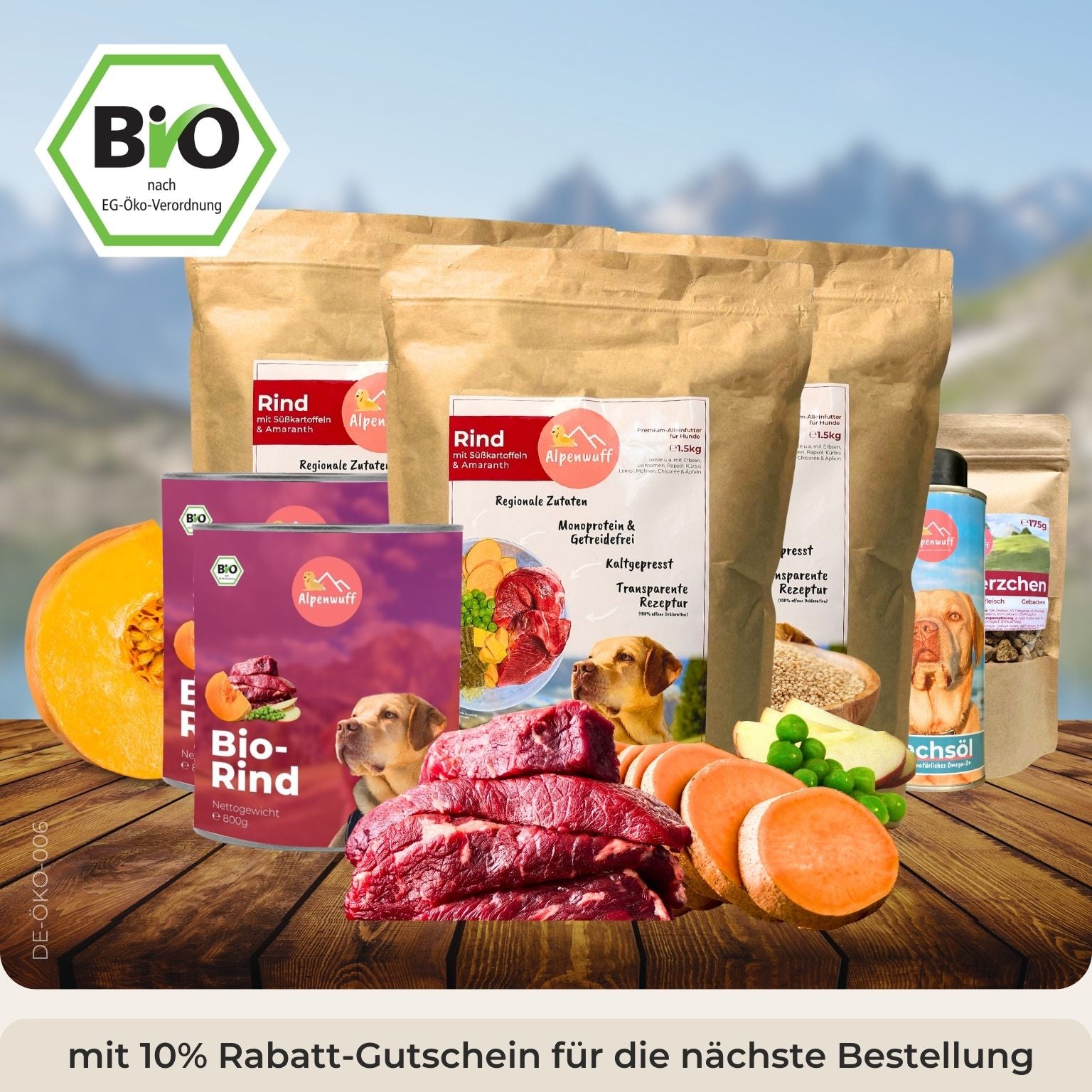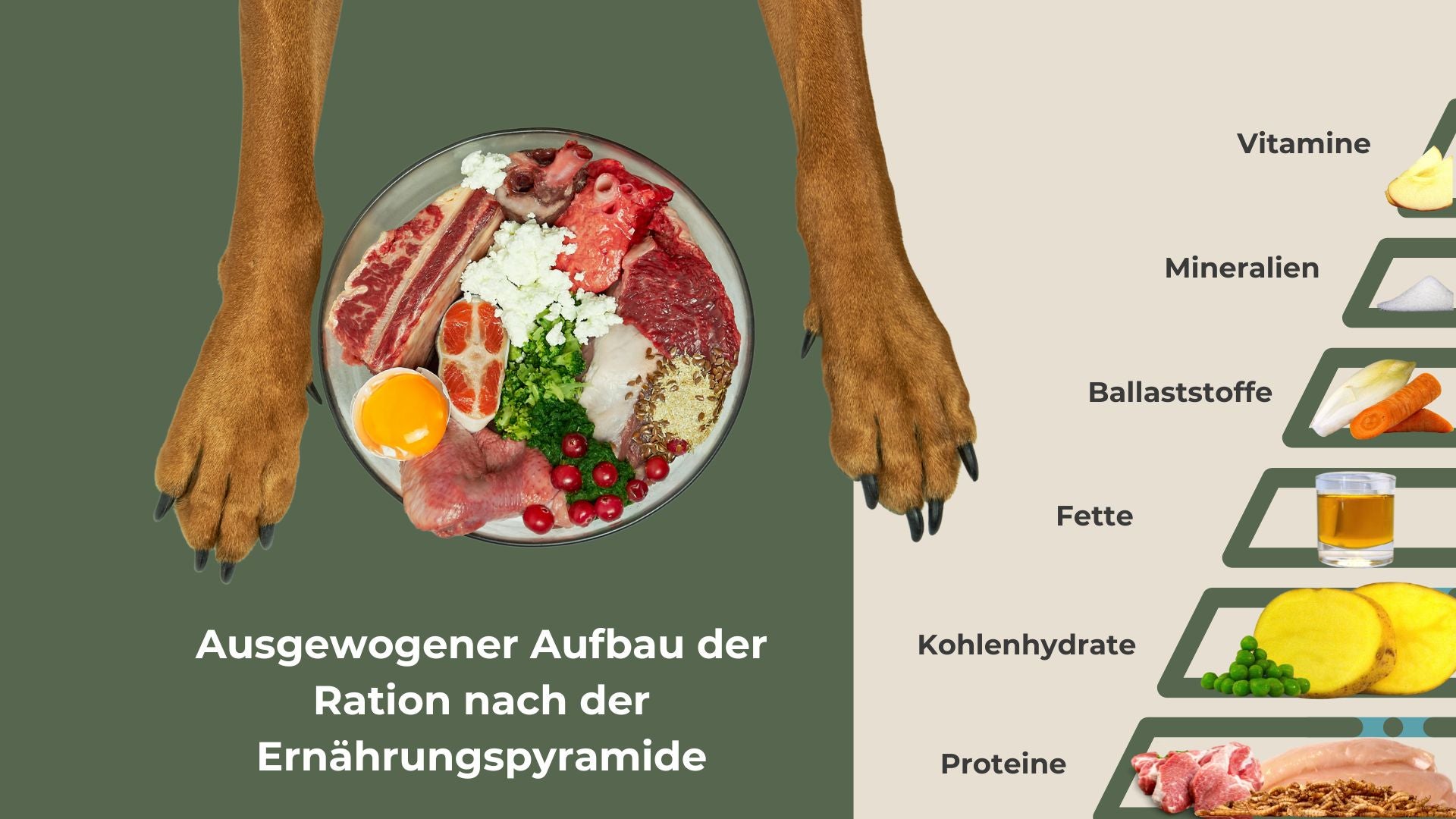
Our ingredients and their effects
A food is only as good as its ingredients. Therefore, at Alpenwuff, we place great importance on exquisite ingredients and would like to explain the selection and background of our ingredients here. All ingredients used are listed on this page with an explanation of their contribution to the food and, where available, scientific findings and studies. All foods are structured according to the nutritional pyramid and contain balanced proportions of animal and plant proteins, carbohydrates, vitamins, fats and oils, and minerals.
 5.000+ Hunde freuen sich täglich auf Alpenwuff.
5.000+ Hunde freuen sich täglich auf Alpenwuff.
Proteins
Proteins are one of the most important components in food, as they provide proteins that are broken down during digestion, first into peptides and then into their subunits, the amino acids. These are then used by the body to build its own proteins.
Animal protein sources: Highest quality for our dogs
Poultry meat / (organic) chicken
Poultry is characterized by its high protein content and low fat content and is considered a highly digestible source of animal protein for many dogs. It's not for nothing that poultry is also known as fitness meat among us humans. 🏋️♀️ Furthermore, poultry is a comparatively sustainable source of protein compared to beef, pork, or horse. The water, space, and food consumption in raising poultry are comparatively low.
Our dry food uses meat ingredients from food production in Lower Saxony . The exact proportions of the individual ingredients vary from delivery to delivery, similar to human consumption, but may contain offal such as lungs, liver, heart, muscle meat (e.g., from the neck), and carcass meat with carcass remnants as a source of calcium. Non-meat by-products such as feathers and blood are not processed in our food.
The wet food contains fresh organic chicken, divided into 68% breast meat, 15% carcass, 7% neck, 5% liver, 5% heart, from Germany, Austria and Italy.
In addition to these properties, poultry meat also contains minerals such as zinc, iron, and potassium, as well as, above all, B vitamins . At 28.5%, dried poultry meat, which corresponds to approximately 76% of fresh meat , is the most important and largest component in Alpenwuff poultry food.
Studies also show:
- The consumption of poultry meat has a protective or neutral effect on cancer risk ( Maragoni et al., 2015 )
- The bioavailability of taurine is higher in chicken than in lamb (Torres et al, 2003)
- Low levels of coenzyme Q10 (e.g. in chicken liver) reduce the effects of heart failure (Harker-Murray, 2000)
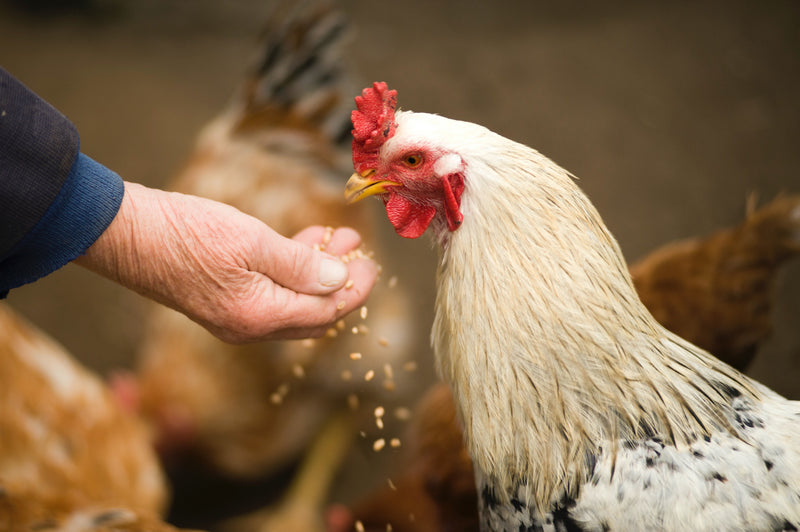
lamb
Lamb provides high-quality protein , is particularly easy to digest, and contains important minerals such as iron and zinc. It's ideal for dogs with nutritional sensitivities and those who are overweight, as the meat is relatively lean and low in fat . Lamb also contributes to strengthening the immune system and blood formation, as it contains vitamins A, C, D, K, and B12, and promotes bone metabolism. Due to pasture-raised meat, it's also considered "stress-free meat"—meat with fewer stress hormones than other protein sources.
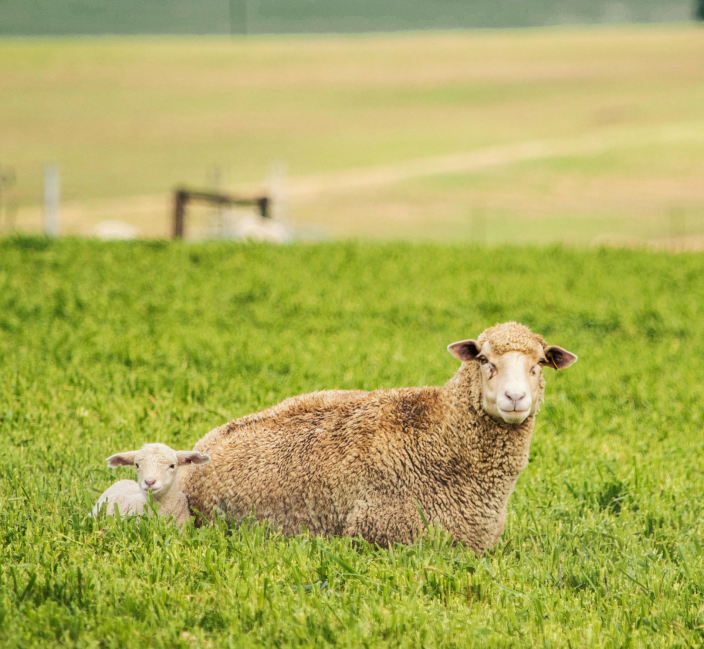
beef
Beef is a classic source of protein, rich in iron, zinc, selenium, vitamin B12, and biologically beneficial proteins ( Bourre, 2011 ). It contributes significantly to blood formation and the maintenance of healthy muscles. It also provides creatine and carnitine, which are important for muscle energy. Its robust flavor makes it particularly attractive to many dogs.
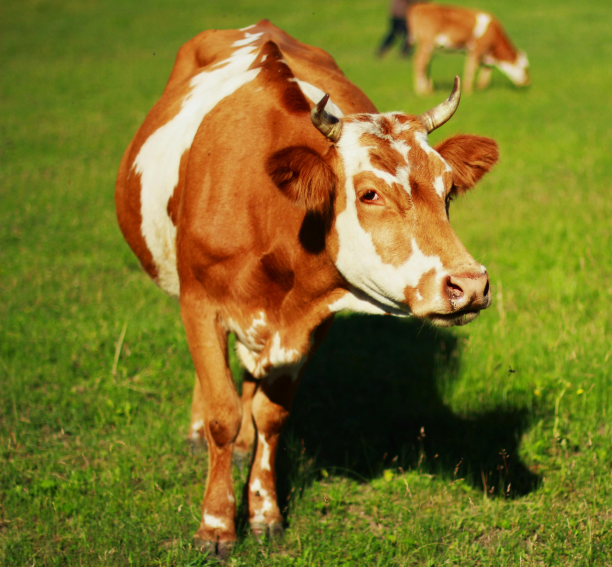
Insects (Hermetia Illucens)
Black soldier fly protein is hypoallergenic, easily digestible, and provides all essential amino acids. It is also particularly sustainable in its production. Insect protein contains lauric acid, which can have antimicrobial effects. It is ideal for allergy sufferers and sensitive dogs.
Studies show:
Protein and fat digestibility of insects is equal ( Meyer et al., 2019 ) or higher than other protein sources with the same or better fecal quality (El-Wahab et al., 2021 , Penazzi et al., 2021 ).
Poultry is characterized by its high protein content and low fat content and is considered a highly digestible source of animal protein for many dogs. It's not for nothing that poultry is also known as fitness meat among us humans. 🏋️♀️ Furthermore, poultry is a comparatively sustainable source of protein compared to beef, pork, or horse. The water, space, and food consumption in raising poultry are comparatively low.
Our dry food uses meat ingredients from food production in Lower Saxony . The exact proportions of the individual ingredients vary from delivery to delivery, similar to human consumption, but may contain offal such as lungs, liver, heart, muscle meat (e.g., from the neck), and carcass meat with carcass remnants as a source of calcium. Non-meat by-products such as feathers and blood are not processed in our food.
The wet food contains fresh organic chicken, divided into 68% breast meat, 15% carcass, 7% neck, 5% liver, 5% heart, from Germany, Austria and Italy.
In addition to these properties, poultry meat also contains minerals such as zinc, iron, and potassium, as well as, above all, B vitamins . At 28.5%, dried poultry meat, which corresponds to approximately 76% of fresh meat , is the most important and largest component in Alpenwuff poultry food.
Studies also show:
- The consumption of poultry meat has a protective or neutral effect on cancer risk ( Maragoni et al., 2015 )
- The bioavailability of taurine is higher in chicken than in lamb (Torres et al, 2003)
- Low levels of coenzyme Q10 (e.g. in chicken liver) reduce the effects of heart failure (Harker-Murray, 2000)

Lamb provides high-quality protein , is particularly easy to digest, and contains important minerals such as iron and zinc. It's ideal for dogs with nutritional sensitivities and those who are overweight, as the meat is relatively lean and low in fat . Lamb also contributes to strengthening the immune system and blood formation, as it contains vitamins A, C, D, K, and B12, and promotes bone metabolism. Due to pasture-raised meat, it's also considered "stress-free meat"—meat with fewer stress hormones than other protein sources.

Beef is a classic source of protein, rich in iron, zinc, selenium, vitamin B12, and biologically beneficial proteins ( Bourre, 2011 ). It contributes significantly to blood formation and the maintenance of healthy muscles. It also provides creatine and carnitine, which are important for muscle energy. Its robust flavor makes it particularly attractive to many dogs.

Black soldier fly protein is hypoallergenic, easily digestible, and provides all essential amino acids. It is also particularly sustainable in its production. Insect protein contains lauric acid, which can have antimicrobial effects. It is ideal for allergy sufferers and sensitive dogs.
Studies show:
Protein and fat digestibility of insects is equal ( Meyer et al., 2019 ) or higher than other protein sources with the same or better fecal quality (El-Wahab et al., 2021 , Penazzi et al., 2021 ).
Plant protein sources
Amaranth
Amaranth is a gluten-free pseudocereal with a high protein content and a good amino acid profile . It contains a lot of magnesium , iron , and secondary plant compounds . Its small grains make it easily digestible. It is an excellent energy and protein source for active dogs .
pea
Peas are a healthy source of nutrients and fiber. They provide 50% of valuable carbohydrates and approximately 25% plant-based protein . In addition to easily digestible starch as a source of carbohydrates, peas also contain less digestible carbohydrates in the form of oligosaccharides . They also contain vitamins A and C, as well as important minerals such as calcium, potassium, magnesium, and sodium. Peas contain high-quality amino acids, especially lysine .
Pea proteins also promote muscle cell development and reduce blood sugar fluctuations because carbohydrates are absorbed slowly into the bloodstream. Although peas have a high crude fiber content (up to 6%), they are highly digestible provided they are cooked and broken down beforehand.
In 2019, the U.S. Food and Drug Administration warned of a possible link between dilated cardiomyopathy (DCM), especially in vegetarian, grain-free diets. It is now clear that the suspicion applies to both grain-free and non-grain-free diets. Research has been ongoing since 2019, but the suspicion has not been confirmed. Nevertheless, the proportion of peas and beans should not exceed 20% of the diet.
Amaranth is a gluten-free pseudocereal with a high protein content and a good amino acid profile . It contains a lot of magnesium , iron , and secondary plant compounds . Its small grains make it easily digestible. It is an excellent energy and protein source for active dogs .
Peas are a healthy source of nutrients and fiber. They provide 50% of valuable carbohydrates and approximately 25% plant-based protein . In addition to easily digestible starch as a source of carbohydrates, peas also contain less digestible carbohydrates in the form of oligosaccharides . They also contain vitamins A and C, as well as important minerals such as calcium, potassium, magnesium, and sodium. Peas contain high-quality amino acids, especially lysine .
Pea proteins also promote muscle cell development and reduce blood sugar fluctuations because carbohydrates are absorbed slowly into the bloodstream. Although peas have a high crude fiber content (up to 6%), they are highly digestible provided they are cooked and broken down beforehand.
In 2019, the U.S. Food and Drug Administration warned of a possible link between dilated cardiomyopathy (DCM), especially in vegetarian, grain-free diets. It is now clear that the suspicion applies to both grain-free and non-grain-free diets. Research has been ongoing since 2019, but the suspicion has not been confirmed. Nevertheless, the proportion of peas and beans should not exceed 20% of the diet.
Plant-based carbohydrate and fiber sources
Plant-based protein, carbohydrate, and fiber sources make an important contribution to the nutritional diversity of dog food. They provide complex carbohydrates as a sustainable energy source, plant-based proteins to complement the amino acid profile, and soluble and insoluble fiber to promote intestinal health. Fiber improves stool consistency and stimulates natural intestinal motility. At the same time, many plant-based ingredients contain phytochemicals and vitamins that can support antioxidant and anti-inflammatory effects.
Carbohydrate sources
potatoes
Potatoes are an important source of carbohydrates in Alpenwuff food because they are nutrient-rich and low in fat . Their starch content makes them a healthy and tasty source of carbohydrates for dogs, which is generally well tolerated even by allergy sufferers. They must be gently cooked or boiled before feeding to ensure the starch is accessible to dogs. Potatoes also contain valuable minerals such as a remarkably high potassium content, as well as phosphorus, calcium, and magnesium, as well as vitamins C, B1, B2, and B6.
rice
Rice is an easily digestible energy source that is particularly well-tolerated by those with a sensitive gastrointestinal tract. It contains complex carbohydrates and supports a balanced diet. Rice also provides small amounts of magnesium and B vitamins. In hypoallergenic diets, rice is often used as the sole carbohydrate source. But be careful: rice is a grain !
sweet potato
Sweet potatoes are rich in fiber , beta-carotene (vitamin A), and antioxidant plant compounds. They support intestinal health and strengthen the immune system . Their low glycemic index ensures a steady energy supply. They also contain phytochemicals with anti-inflammatory effects. They are a good alternative for dogs with potato allergies.
pumpkin
Pumpkin contains a lot of fiber as well as vitamins A and E and is considered a natural source of antioxidants ( Oloyede et al., 2012) . It is considered gentle on the stomach and supports intestinal regulation . Pumpkin is also very suitable for dogs with a potato allergy or intolerance.
Potatoes are an important source of carbohydrates in Alpenwuff food because they are nutrient-rich and low in fat . Their starch content makes them a healthy and tasty source of carbohydrates for dogs, which is generally well tolerated even by allergy sufferers. They must be gently cooked or boiled before feeding to ensure the starch is accessible to dogs. Potatoes also contain valuable minerals such as a remarkably high potassium content, as well as phosphorus, calcium, and magnesium, as well as vitamins C, B1, B2, and B6.
Rice is an easily digestible energy source that is particularly well-tolerated by those with a sensitive gastrointestinal tract. It contains complex carbohydrates and supports a balanced diet. Rice also provides small amounts of magnesium and B vitamins. In hypoallergenic diets, rice is often used as the sole carbohydrate source. But be careful: rice is a grain !
Sweet potatoes are rich in fiber , beta-carotene (vitamin A), and antioxidant plant compounds. They support intestinal health and strengthen the immune system . Their low glycemic index ensures a steady energy supply. They also contain phytochemicals with anti-inflammatory effects. They are a good alternative for dogs with potato allergies.
Pumpkin contains a lot of fiber as well as vitamins A and E and is considered a natural source of antioxidants ( Oloyede et al., 2012) . It is considered gentle on the stomach and supports intestinal regulation . Pumpkin is also very suitable for dogs with a potato allergy or intolerance.
Vegetables and fruit
carrot
Carrots provide beta-carotene, a precursor to vitamin A, which is important for skin, mucous membranes, and vision. At the same time, their fiber promotes healthy digestion.
Studies also show:
- Luteolin (found in carrots) has shown strong anti-inflammatory properties ( Kanai et al., 2021 )
- A source of beta-carotene (e.g., carrots) is crucial for dogs. Vitamin A deficiency can lead to weight loss, immune deficiency, and vision problems in dogs, and can impede normal growth in puppies ( Green et al., 2016 ).
Apple
Apples contain pectins , which promote healthy intestinal flora , as well as vitamin C and secondary plant compounds . They add natural sweetness and freshness to the food.
Beetroot
Beetroot is rich in iron , folic acid , and antioxidant betalains . It supports blood formation and can have a positive effect on the liver and gallbladder .
parsnip
Parsnips provide valuable carbohydrates and vitamin C , as well as potassium and folic acid . They are mild and easily digestible .
Carrots provide beta-carotene, a precursor to vitamin A, which is important for skin, mucous membranes, and vision. At the same time, their fiber promotes healthy digestion.
Studies also show:
- Luteolin (found in carrots) has shown strong anti-inflammatory properties ( Kanai et al., 2021 )
- A source of beta-carotene (e.g., carrots) is crucial for dogs. Vitamin A deficiency can lead to weight loss, immune deficiency, and vision problems in dogs, and can impede normal growth in puppies ( Green et al., 2016 ).
Apples contain pectins , which promote healthy intestinal flora , as well as vitamin C and secondary plant compounds . They add natural sweetness and freshness to the food.
Beetroot is rich in iron , folic acid , and antioxidant betalains . It supports blood formation and can have a positive effect on the liver and gallbladder .
Parsnips provide valuable carbohydrates and vitamin C , as well as potassium and folic acid . They are mild and easily digestible .
Fats and oils
Fats and oils are essential components of a balanced dog diet. They provide concentrated energy and facilitate the absorption of fat-soluble vitamins (A, D, E, and K). High-quality fatty acids, especially omega-3 and omega-6, support skin health, promote a shiny coat, and have anti-inflammatory properties. They are also important for cell membrane structure and contribute to hormone production.
Salmon oil
Salmon oil primarily provides the fatty acids eicosapentaenoic acid (EPA) and docosahexaenoic acid (DHA). It is therefore a high-quality source of omega-3 fatty acids (EPA, DHA), which have anti-inflammatory effects and support skin, coat, and joints .
Studies show:
- Omega-3 fatty acids significantly reduce pain in rheumatoid arthritis (Geusens et al., 1994 )
- The anti-inflammatory properties of Omega-3 benefit autoimmune diseases such as Crohn's disease, ulcerative colitis and lupus ( Simopoulos, 2002 )
- Omega-3 fatty acids from fish oil influence inflammatory and immune responses in dogs. They also improve skin and coat health and the neurological development of puppies ( Bauer, 2007 ).
- EPA and DHA reduce the symptoms of atopic dermatitis in dogs ( Müller et al., 2004 )
rapeseed oil
Rapeseed oil contains monounsaturated fatty acids as well as linoleic acid and α-linolenic acid (ALA). It supports cellular health and has a positive effect on skin and coat.
linseed oil
Flaxseed oil is particularly rich in α-linolenic acid (ALA), a plant-based omega-3 fatty acid. It has anti-inflammatory properties and supports digestion.
safflower oil
Safflower oil is particularly rich in linoleic acid , an essential omega-6 fatty acid. This supports skin regeneration , ensures a shiny coat , and has a regulating effect on inflammatory processes. It is also easily digestible and well-suited for promoting healthy skin.
Salmon oil primarily provides the fatty acids eicosapentaenoic acid (EPA) and docosahexaenoic acid (DHA). It is therefore a high-quality source of omega-3 fatty acids (EPA, DHA), which have anti-inflammatory effects and support skin, coat, and joints .
Studies show:
- Omega-3 fatty acids significantly reduce pain in rheumatoid arthritis (Geusens et al., 1994 )
- The anti-inflammatory properties of Omega-3 benefit autoimmune diseases such as Crohn's disease, ulcerative colitis and lupus ( Simopoulos, 2002 )
- Omega-3 fatty acids from fish oil influence inflammatory and immune responses in dogs. They also improve skin and coat health and the neurological development of puppies ( Bauer, 2007 ).
- EPA and DHA reduce the symptoms of atopic dermatitis in dogs ( Müller et al., 2004 )
Rapeseed oil contains monounsaturated fatty acids as well as linoleic acid and α-linolenic acid (ALA). It supports cellular health and has a positive effect on skin and coat.
Flaxseed oil is particularly rich in α-linolenic acid (ALA), a plant-based omega-3 fatty acid. It has anti-inflammatory properties and supports digestion.
Safflower oil is particularly rich in linoleic acid , an essential omega-6 fatty acid. This supports skin regeneration , ensures a shiny coat , and has a regulating effect on inflammatory processes. It is also easily digestible and well-suited for promoting healthy skin.
Other ingredients
In addition to the main components such as proteins, carbohydrates, and fats, high-quality dog food contains a variety of functional additives. These include mineral suppliers, vitamin sources, prebiotic ingredients, joint nutrients, and immune-boosting plant compounds.
whole egg
Whole eggs are a particularly high-quality protein containing all essential amino acids. They also provide biotin, selenium, iron, and fat-soluble vitamins such as A and D.
Studies show:
- Eggs have a strong protein and nutrient profile ( Réhault-Godbert et al., 2019 )
- Egg protein diets to support dogs with induced chronic renal failure (Polzin & Osborne, 1988 )
- Selenium deficiency may play a role in fertility, parasitic diseases, and cancer in dogs ( Zentrichová et al., 2021 )
linseed
Flaxseeds contain a lot of fiber and are rich in omega-3 fatty acids (especially α-linolenic acid) and proteins. They promote digestion , support good stool consistency , and can protect the stomach lining . They also provide vitamins (e.g., B vitamins) and have a positive effect on skin and coat.
Studies show:
- Flaxseed reduces the expression of inflammation-related genes in dogs ( Purushothaman et al., 2014)
- The administration of flaxseed led to a significant improvement in the condition of the skin and coat after 28 days ( Rees et al., 2001 )
Carob flour
Carob flour is obtained from the seeds of the carob tree and is rich in fiber and natural pectins . It supports healthy digestion , can regulate diarrhea , and stabilizes stool consistency . It also contains important minerals such as calcium and iron and has a mild prebiotic effect, as it can promote the growth of beneficial intestinal bacteria.
Seaweed flour & knotted kelp
Seaweed meal is ground knotted kelp, which is very rich in iodine . Seaweed also contains other important minerals, such as potassium and sodium. Overall, seaweed meal is a good supplement for our four-legged friends' metabolism.
Spirulina Echinacea
Spirulina is a nutrient-rich microalgae that offers an exceptionally high concentration of proteins , vitamins (e.g., B12), and minerals . It supports the immune system , has anti-inflammatory properties , and can promote regeneration and vitality . Spirulina also provides natural antioxidants that help scavenge free radicals . Echinacea (coneflower) is known for its immune-boosting properties. The secondary plant substances it contains can stimulate the body's defenses and help prevent infections . Echinacea naturally supports a stable immune response , especially in young or stressed dogs.
Whole eggs are a particularly high-quality protein containing all essential amino acids. They also provide biotin, selenium, iron, and fat-soluble vitamins such as A and D.
Studies show:
- Eggs have a strong protein and nutrient profile ( Réhault-Godbert et al., 2019 )
- Egg protein diets to support dogs with induced chronic renal failure (Polzin & Osborne, 1988 )
- Selenium deficiency may play a role in fertility, parasitic diseases, and cancer in dogs ( Zentrichová et al., 2021 )
Flaxseeds contain a lot of fiber and are rich in omega-3 fatty acids (especially α-linolenic acid) and proteins. They promote digestion , support good stool consistency , and can protect the stomach lining . They also provide vitamins (e.g., B vitamins) and have a positive effect on skin and coat.
Studies show:
- Flaxseed reduces the expression of inflammation-related genes in dogs ( Purushothaman et al., 2014)
- The administration of flaxseed led to a significant improvement in the condition of the skin and coat after 28 days ( Rees et al., 2001 )
Carob flour is obtained from the seeds of the carob tree and is rich in fiber and natural pectins . It supports healthy digestion , can regulate diarrhea , and stabilizes stool consistency . It also contains important minerals such as calcium and iron and has a mild prebiotic effect, as it can promote the growth of beneficial intestinal bacteria.
Seaweed meal is ground knotted kelp, which is very rich in iodine . Seaweed also contains other important minerals, such as potassium and sodium. Overall, seaweed meal is a good supplement for our four-legged friends' metabolism.
Spirulina is a nutrient-rich microalgae that offers an exceptionally high concentration of proteins , vitamins (e.g., B12), and minerals . It supports the immune system , has anti-inflammatory properties , and can promote regeneration and vitality . Spirulina also provides natural antioxidants that help scavenge free radicals . Echinacea (coneflower) is known for its immune-boosting properties. The secondary plant substances it contains can stimulate the body's defenses and help prevent infections . Echinacea naturally supports a stable immune response , especially in young or stressed dogs.
Chicory
Chicory is a native vegetable with several superpowers. It's particularly rich in vitamins A, B1, B2, K, and C, as well as beta-carotene. These are good for bones, eyesight, and the general immune system of four-legged friends. Chicory is also an important source of fructooligosaccharides (FOS) and inulin, and thus also has prebiotic properties. Like other prebiotics, FOS has a positive effect on the intestinal flora and, among other things, stimulates bacteria beneficial for digestion.
Goji berries
Goji berries are a true hero among superfoods. They are rich in vitamins A, B1-3, C, and E, and provide iron, antioxidants, and amino acids. This combination strengthens the immune system and provides energy and well-being for your furry friends.
sage
Sage is one of the alpine herbs that convinced us to use in our food. It has a natural antibacterial effect, thus promoting oral hygiene and clear airways for our furry friends. Furthermore, its bitter compounds support digestion.
Parsley
Parsley is another herb that also grows in the Alps—at least in the huts—and was therefore a must for Alpine dogs. Parsley contains vitamins A and C, beta-carotene, and minerals such as potassium, iron, manganese, and zinc. Parsley can stimulate the appetite and aid digestion and metabolism. In particular, parsley is said to help relieve flatulence, reduce bad breath, and improve liver, kidney, and bladder function.
Algal lime
Algal lime is extracted from fossilized red algae and is a natural source of calcium and other minerals such as magnesium. Calcium is essential for the development of bones and teeth , supports muscle function , and supports nerve conduction . Algal lime is also particularly well tolerated and is a sustainable alternative to mineral calcium.
Chicory is a native vegetable with several superpowers. It's particularly rich in vitamins A, B1, B2, K, and C, as well as beta-carotene. These are good for bones, eyesight, and the general immune system of four-legged friends. Chicory is also an important source of fructooligosaccharides (FOS) and inulin, and thus also has prebiotic properties. Like other prebiotics, FOS has a positive effect on the intestinal flora and, among other things, stimulates bacteria beneficial for digestion.
Goji berries are a true hero among superfoods. They are rich in vitamins A, B1-3, C, and E, and provide iron, antioxidants, and amino acids. This combination strengthens the immune system and provides energy and well-being for your furry friends.
Sage is one of the alpine herbs that convinced us to use in our food. It has a natural antibacterial effect, thus promoting oral hygiene and clear airways for our furry friends. Furthermore, its bitter compounds support digestion.
Parsley is another herb that also grows in the Alps—at least in the huts—and was therefore a must for Alpine dogs. Parsley contains vitamins A and C, beta-carotene, and minerals such as potassium, iron, manganese, and zinc. Parsley can stimulate the appetite and aid digestion and metabolism. In particular, parsley is said to help relieve flatulence, reduce bad breath, and improve liver, kidney, and bladder function.
Algal lime is extracted from fossilized red algae and is a natural source of calcium and other minerals such as magnesium. Calcium is essential for the development of bones and teeth , supports muscle function , and supports nerve conduction . Algal lime is also particularly well tolerated and is a sustainable alternative to mineral calcium.
Cranberries
Cranberries contain antioxidant polyphenols and vitamin C. They are known for their protective effects on the urinary tract and the immune system.
tomato
Tomatoes contain valuable antioxidants such as lycopene , vitamin C , and beta-carotene , which strengthen the immune system and support cellular health . When processed in small quantities, tomatoes contribute to the body's natural vitamin supply and can help reduce oxidative stress . It's important to use only ripe tomatoes, as green parts (such as stems and leaves) can be toxic.
gelatin
Gelatin contains collagen, which supports joint health and can promote mobility. It can also contribute to maintaining skin structure and is an important ingredient in the pressing of cold-pressed food.
(Beer) yeast
Brewer's yeast provides B vitamins, proteins, and minerals in their natural form. It also supports digestion, strengthens the immune system, and promotes healthy skin and a shiny coat.
Yucca Schidigera
Yucca schidigera is a medicinal plant whose extracts are rich in saponins and polyphenols . These ingredients have anti-inflammatory and antioxidant properties and can support digestion . Especially in puppy food, yucca helps stabilize the intestinal flora and relieve growing pains . We use this natural remedy exclusively in our puppy food.
Cranberries contain antioxidant polyphenols and vitamin C. They are known for their protective effects on the urinary tract and the immune system.
Tomatoes contain valuable antioxidants such as lycopene , vitamin C , and beta-carotene , which strengthen the immune system and support cellular health . When processed in small quantities, tomatoes contribute to the body's natural vitamin supply and can help reduce oxidative stress . It's important to use only ripe tomatoes, as green parts (such as stems and leaves) can be toxic.
Gelatin contains collagen, which supports joint health and can promote mobility. It can also contribute to maintaining skin structure and is an important ingredient in the pressing of cold-pressed food.
Brewer's yeast provides B vitamins, proteins, and minerals in their natural form. It also supports digestion, strengthens the immune system, and promotes healthy skin and a shiny coat.
Yucca schidigera is a medicinal plant whose extracts are rich in saponins and polyphenols . These ingredients have anti-inflammatory and antioxidant properties and can support digestion . Especially in puppy food, yucca helps stabilize the intestinal flora and relieve growing pains . We use this natural remedy exclusively in our puppy food.
Sodium chloride (NaCl)
Salt supports electrolyte and water balance in the body. It is essential for nerve and muscle function.
rosemary
Rosemary contains natural antioxidants such as rosmarinic acid and carnosol , which help reduce oxidative stress and support the immune system . Rosemary also has mild antimicrobial properties and can stimulate digestion . Used in small amounts, rosemary is a natural aid for cellular health and for the natural preservation of feed.
Collagen hydrolysate
Collagen hydrolysate provides easily digestible collagen peptides that specifically support the development of joints, cartilage, and tendons . Especially in growing puppies, it promotes the healthy development of the musculoskeletal system and can prevent later joint problems. It also supports the regeneration of connective tissue and contributes to a stable body structure.
Monocalcium phosphate
Monocalcium phosphate provides the minerals calcium and phosphorus in a readily available form, both essential for bone and tooth development . It supports optimal skeletal growth and energy metabolism , especially in growing dogs. A balanced calcium-phosphorus ratio is crucial for the long-term health of bones, muscles, and organ function and is achieved through monocalcium phosphate.
Calcium carbonate
Calcium carbonate is a natural source of calcium , essential for building and maintaining strong bones and teeth . It also supports muscle contraction , nerve function , and healthy blood clotting .
Salt supports electrolyte and water balance in the body. It is essential for nerve and muscle function.
Rosemary contains natural antioxidants such as rosmarinic acid and carnosol , which help reduce oxidative stress and support the immune system . Rosemary also has mild antimicrobial properties and can stimulate digestion . Used in small amounts, rosemary is a natural aid for cellular health and for the natural preservation of feed.
Collagen hydrolysate provides easily digestible collagen peptides that specifically support the development of joints, cartilage, and tendons . Especially in growing puppies, it promotes the healthy development of the musculoskeletal system and can prevent later joint problems. It also supports the regeneration of connective tissue and contributes to a stable body structure.
Monocalcium phosphate provides the minerals calcium and phosphorus in a readily available form, both essential for bone and tooth development . It supports optimal skeletal growth and energy metabolism , especially in growing dogs. A balanced calcium-phosphorus ratio is crucial for the long-term health of bones, muscles, and organ function and is achieved through monocalcium phosphate.
Calcium carbonate is a natural source of calcium , essential for building and maintaining strong bones and teeth . It also supports muscle contraction , nerve function , and healthy blood clotting .
Alpenwuff trial packages
If you're curious to see if your dog enjoys our Alpenwuff food as much as Calu and the over 3,000 other dogs who already enjoy a healthy diet with Alpenwuff , then feel free to check out our sample pack. Because, as we all know, trying is better than studying!

We are always there for you.
Questions, feedback, or suggestions? Visit our "Quick Help" section or call us directly – we're always here for you and your pet.
 5.000+ Hunde freuen sich täglich auf Alpenwuff.
5.000+ Hunde freuen sich täglich auf Alpenwuff.
